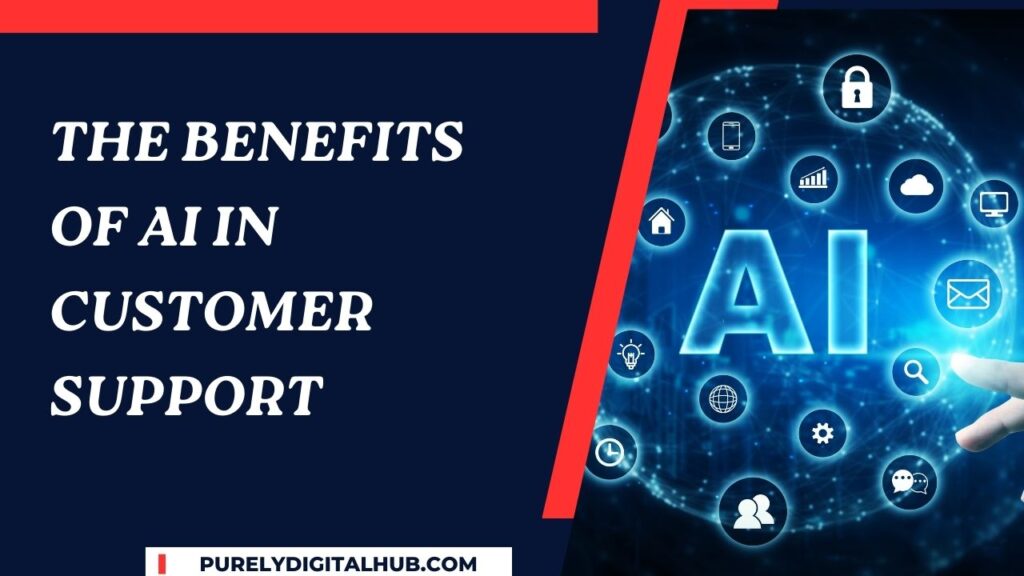Customer support is a cornerstone of business success, and with the advancement of artificial intelligence (AI), companies are transforming how they address customer needs. AI-powered customer support tools offer efficiency, personalization, and scalability, enabling businesses to provide faster and more accurate responses while reducing operational costs. This blog explores the key benefits of AI in customer support and how it reshapes the customer experience.
Faster Response Times
24/7 Availability
AI-powered chatbots and virtual assistants provide round-the-clock support, ensuring customers receive immediate assistance at any time. This eliminates the frustration of waiting for human agents during non-business hours.
Instant Solutions to Common Queries
AI can handle repetitive and straightforward questions, such as order status, refund policies, or product information. This reduces the workload on human agents and allows them to focus on complex issues.
| Feature | Benefit |
|---|---|
| 24/7 Availability | Immediate support for customers |
| Instant Query Resolution | Reduced wait times |
Cost Efficiency
Reduced Operational Costs
AI reduces the need for large support teams by automating routine tasks. Businesses can handle more inquiries with fewer human agents, saving on salaries and training costs.
Scalability
AI tools are easily scalable, allowing businesses to handle increasing volumes of customer queries without additional resources. This is particularly useful during peak times, such as holiday seasons or sales events.
| Cost Factor | Traditional Support | AI-Powered Support |
|---|---|---|
| Staffing Costs | High | Low |
| Scalability | Limited | Seamless |
Enhanced Personalization
Data-Driven Insights
AI analyzes customer behavior, preferences, and past interactions to provide personalized recommendations and solutions. For instance, an AI chatbot can greet a returning customer by name and offer tailored product suggestions.
Predictive Assistance
Using machine learning, AI can anticipate customer needs before they arise. For example, if a customer frequently purchases a product, the AI can remind them when it’s time to reorder.
Improved Accuracy and Consistency
Elimination of Human Errors
Unlike human agents, AI systems consistently provide accurate responses based on pre-programmed data and algorithms. This ensures customers receive reliable and consistent support.
Multilingual Support
AI tools can handle queries in multiple languages, making it easier for businesses to cater to global audiences.
| Feature | Advantage |
|---|---|
| Consistent Responses | Reliable customer interactions |
| Multilingual Capabilities | Global audience accessibility |
Proactive Customer Engagement
Real-Time Monitoring
AI monitors customer interactions in real time, identifying issues such as negative sentiment or complaints. This allows businesses to proactively address concerns before they escalate.
Automated Follow-Ups
AI can schedule and send follow-up messages, ensuring customers feel valued and their concerns are addressed.
Increased Agent Productivity
AI-Assisted Agents
AI tools like sentiment analysis and real-time suggestions help human agents respond more effectively. For instance, AI can suggest the best response based on the context of a conversation.
Reduced Workload
By handling repetitive tasks, AI frees up human agents to focus on more complex and high-value interactions.
| Productivity Enhancer | Impact |
|---|---|
| AI Suggestions | Faster resolution of queries |
| Reduced Workload | Better focus on complex tasks |
Improved Customer Satisfaction (CSAT)
Faster Resolutions
Quick and accurate responses significantly enhance customer satisfaction.
Seamless Omnichannel Support
AI integrates across various channels like chat, email, and social media, providing a seamless and unified customer experience.
| Metric | Improvement with AI |
|---|---|
| Response Time | Faster than traditional support |
| Customer Satisfaction (CSAT) | Higher due to efficiency |
Examples of AI Tools in Customer Support
| Tool | Key Feature | Best Use Case |
|---|---|---|
| ChatGPT | Conversational AI | Answering FAQs |
| Zendesk AI | Automated ticket routing | Optimizing workflows |
| Salesforce Einstein | Predictive analytics | Personalized customer insights |
Challenges of AI in Customer Support
While AI offers significant benefits, there are challenges businesses must address:
Lack of Human Touch
AI can struggle with empathy, which is crucial for handling sensitive or emotional issues. Combining AI with human agents ensures a balanced approach.
Data Privacy Concerns
Using AI requires access to customer data, which raises privacy concerns. Businesses must ensure compliance with regulations like GDPR and CCPA.
Initial Investment
Implementing AI systems can be costly upfront. However, the long-term cost savings often outweigh the initial expense.
Future Trends in AI for Customer Support
AI-Powered Sentiment Analysis
Advanced AI tools will become better at detecting customer emotions and tailoring responses accordingly.
Voice Recognition and Support
AI-powered voice assistants like Alexa and Google Assistant will handle more complex customer support tasks.
Hyper-Personalization
AI will evolve to provide even more tailored experiences, predicting customer needs with greater accuracy.
Conclusion
AI is revolutionizing customer support by delivering faster, more accurate, and cost-effective solutions. From 24/7 availability to enhanced personalization, AI tools empower businesses to meet and exceed customer expectations. While challenges like the lack of human touch remain, the benefits far outweigh the drawbacks. As AI technology continues to advance, it will play an increasingly vital role in shaping the future of customer support and enhancing customer experiences. Businesses that embrace AI today are setting the stage for long-term success and customer loyalty.
